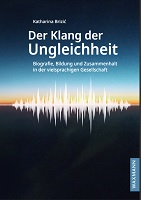Der Klang der Ungleichheit
Biografie, Bildung und Zusammenhalt in der vielsprachigen Gesellschaft
Author(s)
Brizić, Katharina
Collection
DFG - German Research FoundationLanguage
GermanAbstract
Primary school is a unique nucleus of social cohesion. It is here that the diversity of the population is represented together for the last time before they part ways with the transition to secondary school - especially in educational systems as socially unequal as the Austrian and German ones.
The first part of the book is devoted entirely to this diversity, based on 160 Viennese mothers and fathers whose children are just about to finish primary school. In multilingual autobiographical narratives, the parents give controversial, powerful insights into their family histories, language biographies, migration or flight and raise their voices against experienced inequality as well as for the future of their children. In the second part, teachers follow with their perceptions and the pressures of "social selection" at the end of the primary school years. The third and final part of the book looks at the result: the success or failure of the children and how it actually came about: How, once again, was glaring social inequality produced, even though no one wanted it to be? Which parental biographies, which competences of the children were successful, thus heard and appreciated by the teachers, and which remained unsuccessful - despite comparable performance? What did the school perceive of the family history, of the diversity of voices in the first place, and what led to the distortions in institutional "listening"?
The Sound of Inequality documents the multilingualism and polyphony of our globalised times as well as the responsibilities of the education system by juxtaposing empirical testimonies in a challenging way. The author contrasts the thoroughly serious consequences with interdisciplinary perspectives that strengthen teaching and learning in its function of being the nucleus of a migration society in solidarity. Die Grundschule ist eine einzigartige Keimzelle des sozialen Zusammenhalts. Hier ist die Vielfalt der Bevölkerung zum letzten Mal gemeinsam vertreten, bevor sich die Wege mit dem Übertritt in die Sekundarstufe trennen – vor allem in sozial so ungleichen Bildungssystemen wie dem österreichischen und deutschen.
Das Buch widmet sich im ersten Teil ganz dieser Vielfalt, ausgehend von 160 Wiener Müttern und Vätern, deren Kinder knapp vor dem Ende der Grundschulzeit stehen. In vielsprachigen autobiografischen Erzählungen geben die Eltern kontroverse, kraftvolle Einblicke in ihre Familiengeschichte, Sprachenbiografie, Migration oder Flucht und erheben die Stimme gegen erfahrene Ungleichheit sowie für die Zukunft ihrer Kinder. Im zweiten Teil folgen die Lehrkräfte mit ihren Wahrnehmungen und dem Druck, den die „soziale Auslese“ am Ende der Grundschulzeit ausübt. Der dritte und letzte Teil des Buches betrachtet das Resultat: den Erfolg oder Misserfolg der Kinder und sein konkretes Zustandekommen: Wie wurde auch hier wieder eklatante soziale Ungleichheit hergestellt, obwohl dies niemand wollte? Welche elterlichen Biografien, welche Kompetenzen der Kinder waren erfolgreich, wurden also von den Lehrkräften gehört und gewürdigt, und welche blieben – trotz vergleichbarer Leistung – erfolglos? Was hat die Schule von der familiären Geschichte, der Stimmenvielfalt überhaupt wahrgenommen, und was hat zu den Verzerrungen im institutionellen „Hören“ geführt?
Der Klang der Ungleichheit dokumentiert die Vielsprachigkeit und Vielstimmigkeit unserer globalisierten Zeit sowie die Verantwortlichkeiten des Bildungssystems, indem empirische Zeugnisse einander in herausfordernder Weise gegenübergestellt werden. Den durchaus schwerwiegenden Folgen stellt die Autorin interdisziplinäre Perspektiven gegenüber, die das Lehren und Lernen in seiner Funktion stärken, Keimzelle einer solidarischen Migrationsgesellschaft zu sein.
Keywords
Inequality; education; cohesion; mulitilangual societyDOI
10.31244/9783830995944ISBN
9783830945949, 9783830995944Publisher
WaxmannPublication date and place
2022Classification
Education
Primary and middle schools


 Download
Download